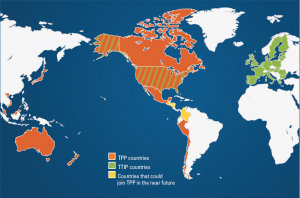Advocating for Free Trade

“As the leader of the West and as a country that has become great and rich because of economic freedom, America must be an unrelenting advocate of free trade.” –Ronald Reagan
With the worst drought in 1,200 years, uncertainty in water policy, declining almond crop yields, almond supply shortages and rising prices, we have never been more focused on the immediate challenges to our industry. As a 105-year-old grower-owned cooperative, we are unique among businesses in that we also think with a longer horizon, including the confidence of eventual rain and snow in sufficient quantities for our trees to recover from the drought. If a strong El Niño pattern persists through winter, we could be less than three years away from a larger almond crop. Our Blue Diamond value-added product strategy was developed for this outcome and our industry will also need a growing export market. Even in a short crop the state is exporting two-thirds of its almonds. Our reliance on exports will increase as our crop yields return to historical levels.
The co-op has been building its export business for over 60 years. Today, Blue Diamond exports to more than 90 countries. Trade tariffs in Europe and Asia are among the biggest impediments to selling value-added almond products as the tariffs increase from commodity almonds to more manufactured or consumer goods. The increased tariffs were established to promote the country’s local industries, but the result is at the expense of jobs in California.
One notable example is Spain, which is a large grower of almonds, but still imports most of its almonds from California. It then manufactures and resells California almonds around Europe under the protection of a 10 percent tariff advantage versus U.S. manufactured almonds. In fact, the U.S. agricultural market share has been declining since 2000 as competition in nearby EU countries increases. This is a clear example where the Transatlantic Trade and Investment Partnership (T-TIP) trade deal with Europe can create jobs for California and regain market share for the U.S.
There is no more important region for U.S. and global economic and security interests than East Asia. Competition among the established and rising powers puts the world’s most economically dynamic neighborhood at risk and only the U.S. can keep the peace by creating mutually profitable investments with Japan, China, South Korea, Indonesia and the Philippines. The Trans-Pacific Partnership (TPP) trade pact solves part of the equation and a China agreement will also be needed in the future.1
Certainly, good news for the future passage of these trade agreements occurred recently when Congress passed and the President signed the Trade Promotion Authority (TPA). TPA allows for Congress to pass these trade agreements on a simple up or down vote and sends a clear message that the U.S. is ready to finalize these agreements.
My interest in free trade agreements is about more than securing a long-term growth strategy for the California almond industry. It is about opening markets, strengthening economic ties and building long-term peace between countries. There are many studies that correlate free trade with reduced genocide and war. As author and publisher Jeffrey Tucker said, “Where there is commerce there is peace.”
In a complex and changing world, some Americans want to retreat to the isolationist economy that has not been possible since the United States was the only major economy left standing after World War II. Later in the last century, disruptions to our economy such as the OPEC oil cartel and the efficiency of Japanese manufacturing were painful, but caused the U.S. to become more efficient and innovative. Our economy is the strongest in the world today because we overcame these challenges. Even if there was a time when we lived in a protective bubble, the U.S. global interdependence is now a fact of life. The 2008 financial crisis in the U.S. pushed most of the world into recession. It took a well-coordinated international response, including Europe, China and the U.S. to shore up financial institutions around the world.
The Trans-Pacific Partnership (TPP), T-TIP and someday bi-lateral deals with China and India offer extraordinary opportunities to prove the power of trade, investment and free-market capitalism to lift billions of people out of poverty and into a truly global middle class. 2
Global trade should be something that can unite our politicians for lower cost of goods for consumers, creating new jobs and securing lasting peace. In a globalized world, America cannot succeed unless our partners succeed too.
